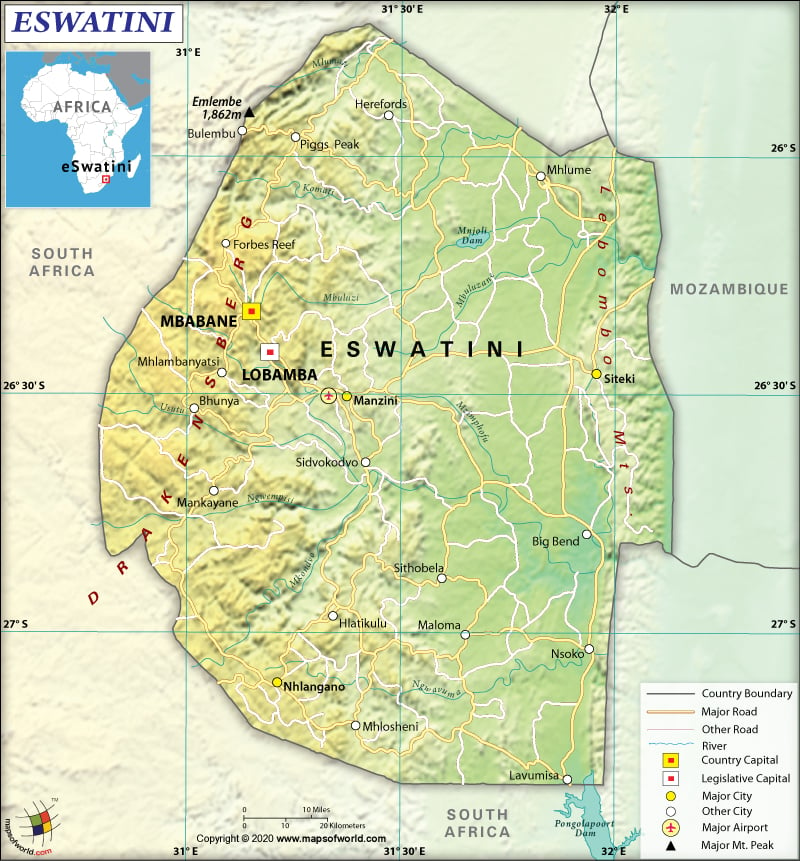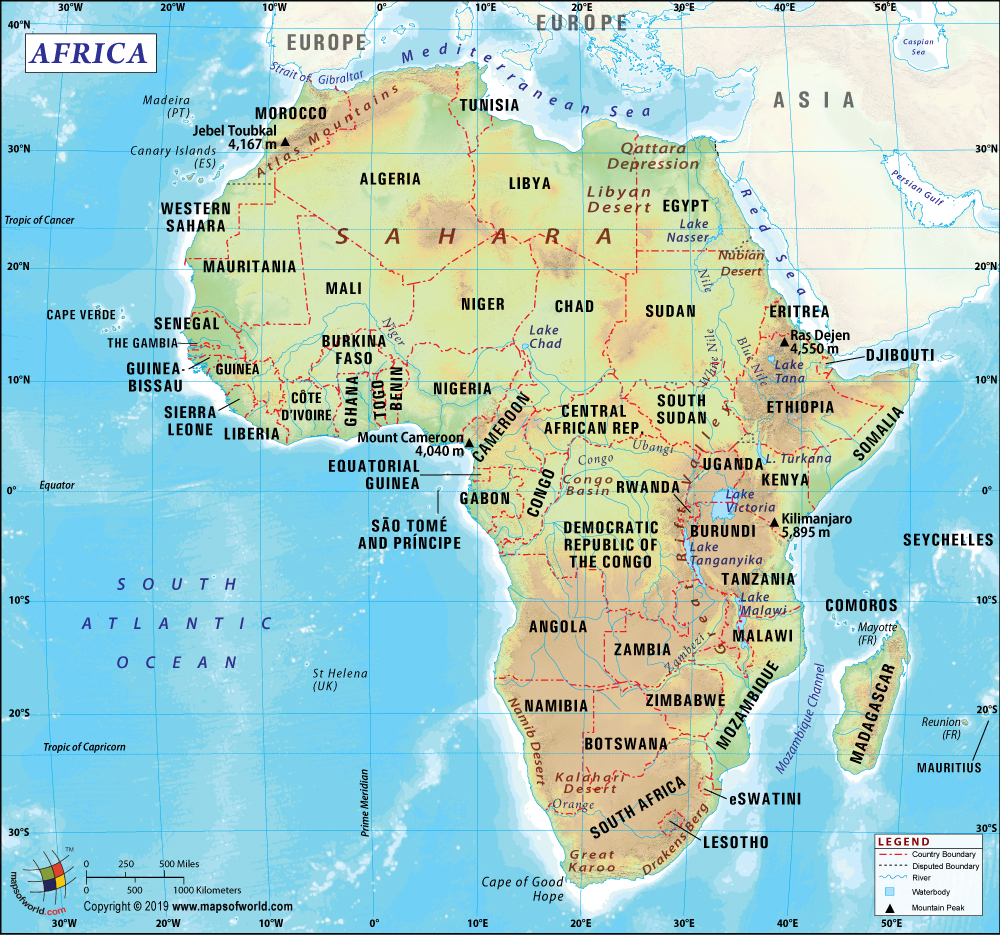What are the Key Facts of eSwatini?

|
Official Name |
Kingdom of Eswatini |
|
Continent |
Africa |
|
Capital |
Mbabane (administrative), Lobamba (legislative) |
|
Largest City |
Mbabane |
|
Coordinates |
-26.500000, 31.500000 |
|
Area |
6,704 sq. mi ( 17,364 sq. km) |
|
Land Boundaries |
339 mi ( 546 km) |
|
Coastline |
0 mi ( 0 km) landlocked |
|
Currency |
Swazi lilangeni (SZL), South African rand (ZAR) |
|
Neighboring Countries |
South Africa, Mozambique |
|
Population |
1,093,238 (2017 Census) |
|
Official Languages |
siSwati, English |
|
Major Religion |
Christianity |
|
National Day |
6 September (Independence Day) |
|
National Anthem |
“Nkulunkulu Mnikati wetibusiso temaSwati” |
|
Form of Government |
Unitary parliamentary absolute diarchy |
|
Ngwenyama (King)/ Ndlovukati (Queen Mother) |
Mswati III (King) / Ntfombi Tfwala (Queen Mother) |
|
Prime Minister |
Ambrose Dlamini |
|
GDP per capita (PPP) |
$ 9,048.2 (World Bank, 2019) |
|
GDP per capita (nominal) |
$ 3,837.0 (World Bank, 2019) |
|
HDI |
0.608 (2019), Rank: 138 |
|
Literacy Rate |
88.42 (UNESCO, 2018) |
|
Space Agency |
NA |
|
Military Expenditure Ranking |
123 (SIPRI, 2019) |
|
No. of Olympic Medals |
0 (as of 2018) |
|
Driving Side |
left |
|
Calling Code |
268 |
|
Time Zone |
UTC+2 (SAST) |
|
Internet TLD |
.sz |
Where is eSwatini?
eSwatini, also known as Eswatini, is a Southern African country that is located between South Africa and Mozambique.
What is the Geography of eSwatini?
The total area of eSwatini is 17,364 sq. km (6,704 sq. mi), out of which 17,204 sq. km (6,643 sq. mi) is land and 160 sq. km (62 sq. mi) is water. It has a 546 km (339 mi) long land boundary, which is shared with South Africa 438 km (272 mi) and Mozambique 108 km (67 mi). As the country is landlocked, there is no coastline.
Eswatini is landlocked between its two neighboring countries South Africa and Mozambique. Along the eastern edge of the country, there is Lubombo Mountains stretch. From these stretches towards central and western parts, the sloping plains give way to rolling hills. The western edges of the country is dominated by the Drakensberg Mountains.
While Emlembe is the highest elevation point at 1,862 m (6,109 ft), the lowest elevation point is the Great Usutu River at 21 m (69 ft). The mean elevation point of Eswatini is 305 m (1,001 ft). Mlembe and Ngwenya are the major mountains of eSwatini. There are 4 major rivers in the country and they are Komati River, Ngwavuma River, Lusutfu River, and Mbuluzi River.
The climate of eSwatini varies from being moderate to subtropical. The lowlands have a subtropical climate and the Highveld regions get cooler temperatures with more clouds and mist. October to March is the summer and during this time the temperature remains pleasant. The lowland areas get the hottest climate, where the temperature reaches as high as 42 °C (108 °F).
Maximum rainfall takes place from mid-October to mid-April. The dry season persists from mid-April to mid-October. The western regions having higher altitudes receive more rainfall. The rain occurs mainly in the afternoon either with thunderstorms or as showers. The austral winter remains dry as well as sunny throughout the country.
What is the Economy of eSwatini?
The Kingdom of Eswatini is categorized as a lower-middle-income country. It has a fairly diversified economy. While the service sector (mainly Government services) accounts for 50% of GDP, manufacturing (including both sugar-related processing and textiles) accounts for 37% of GDP. The agriculture, forestry and mining sectors account for around 13% of the GDP. Fiscal challenges affected the economy’s growth. In 2018, it grew at just 0.6% (in comparison to 1.9% in 2017) to US$ 4,704 million.
The country heavily depends upon its neighboring South Africa in both imports and exports. 85% of imports and 60% of its exports take place in South Africa. eSwatini has a positive trade balance. In 2017, the country exported goods having a value of around US$ 2,016.5 million. It imported around US$ 1,617.2 million in the same year, giving rise to a positive trade balance of US$ 399.3 million.
The major export items are sugar, soft drink concentrates, citrus, refrigerators, cotton yarn, timber, and canned fruit. eSwatini mainly imports transport equipment, machinery, motor vehicles, chemicals, petroleum products, and foodstuffs.
The rate of unemployment is considerably high. It was 22.5% in 2018. However, the unemployment rate is decreasing at an average rate of 1.73% per year in the last thirteen years. Despite being a lower-middle-income economy, eSwatini suffers from the three-pronged evil of poverty, chronic insecurity of food, and HIV/AIDS. Around 63% of the population is still below the national poverty line. El Niño-induced drought also adversely affects the food security condition. Around 159,000 people become food insecure during the lean season, as per the Annual Vulnerability Analysis Assessment 2017.
What is the Transportation System of eSwatini?
eSwatini has a 3,769 km (2,342 mi) long roadway. While there is around 1,500 km (932 mi) of the main road under the National Road Network, the district roads are around 2270 km (1,411 mi) long. Some of the main road networks of eSwatini are MR1 Mbabane, MR3 Ngwenya, MR8 Manzini, MR9 Manzini, MR11 Nhlangano, and MR19 Mbabane.
Minibuses, known as kombi taxis, are the most convenient and hassle-free forms of road transport in the Kingdom of Eswatini. For a more comfortable ride, non-shared rental taxis are also available. For the most affordable travel, buses are the best transport system. However, they are generally overcrowded and unreliable.
There is a 301 km (187 mi) long narrow-gauge railway. There are 14 airports in the country, out of which only 2 have paved runways and rest 12 have unpaved runways. The two main airports of the country are Sikhuphe International Airport and Matsapha Airport. There is no port in the country because it is completely landlocked.
What International Organizations is eSwatini part of?
WTO, IMF, WHO, UN, NAM, UNESCO, ACP, AfDB, AU, C, COMESA, FAO, G-77, IAEA, IBRD, ICAO, ICRM, IDA, IFAD, IFC, IFRCS, ILO, IMO, Interpol, IOC, IOM, ITSO, ITU, MIGA, OPCW, PCA, SACU, SADC, UNCTAD, UNIDO, UNWTO, UPU, WCO, WIPO, WMO, ISO (correspondent), ITUC (NGOs)

